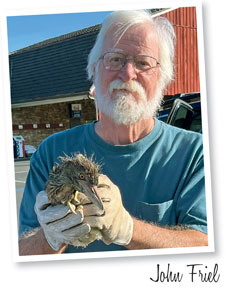1/1/2025
The Perennial Conference, Part II
John Friel

As promised last month, This Space recaps the October 2024 Perennial Plant Conference, held yearly at Scott Arboretum in Swarthmore, Pennsylvania.
Janet Draper: “Playing in the Dirt on the National Mall”
Old friend Janet, like me, served as President of the Perennial Plant Association. Unlike me, she has a dramatic, engaging personality. Her smile lights up any room, even one that seats 600.
Janet has been the sole gardener at the Mary Livingston Ripley Garden, part of the Smithsonian Institute, for 26 years. Unlike many government entities, the National Mall grounds staff is surprisingly small. Said Janet, “The effort is monumental (har!), but the experience is transcendental.”
Gardening has been called the slowest of the performing arts. Most gardeners have no audience, but she said, although “people don’t come to D.C. to see gardens … someone is always watching me.” One upside of being a soloist: “I have no theme. I can do whatever I want. If I can get my hands on it, I’ll plant it.”
Every public garden faces challenges, but the Ripley has some unique ones. Janet asked rhetorically, “How many public gardens are impacted when NATO comes to town?” Barack Obama’s first inauguration drew an audience of 1,000,000-plus. The intricate, intimate 1/3-acre Ripley was trampled into frozen oblivion when the crowd spied a shortcut and stampeded through. The after pictures were ghastly. Total recovery in just two years speaks volumes about the resilience of gardens and gardeners.
Dr. Harland Patch: “The Future of Biodiverse Landscape”
Dr. Patch is Director of Pollinator Programming at Penn State’s Bird and Pollinator Garden. His studies identify cultivars that support pollinators, quantify bee nutrition and track pollinator decline on two continents.
Harland takes a long view of earth’s current status: “Humans arrived yesterday.” Hmmm … anatomically-modern humans have been around for 300,000 years. That’s pretty long, but on the cosmic scale of planetary age, yeah, we’re newcomers.
Directly or indirectly, our diet—from coffee to beef—depends greatly on pollinators. This becomes increasingly true “as we get richer and can move food around the planet.”
What does the future hold? “It’s going to be a warmer, wetter planet, and very buggy.” Within 60 years, he expects Philadelphia’s climate will match today’s Oil City, Louisiana: 11 degrees warmer and 20% wetter in winter.
Unfortunately, he said, “Wherever people go, species and biodiversity decline.” How can we slow that process? “Keep wild places wild. You want bunches of natural habitats, as big as you can get.”
Kenneth Darsney: “Grace Among the Grandeur: Cultivating Well-being at Nemours”
Kenneth is Manager of Gardens and Grounds at Nemours Estate, another fabulous duPont home turned public garden, like the Hagley Museum, Mount Cuba Center and, of course, Longwood. Alfred I. duPont named his 225-acre property for the family’s ancestral home in France. Haven’t visited yet, but spring is coming.
Alfred’s life was marked by business and personal turmoil. He and his second wife (of three) lost two children, probably a factor in his other legacy: the adjacent Alfred I. duPont Hospital for Children. Alfred is buried on the hospital grounds.
Ironically, for decades, children under 12 couldn’t visit the gardens. Under Kenneth, “that’s all changed.” Now, the gardens sometimes close to everyone but hospitalized kids and their families. Doctors write “Estate Prescriptions,” granting access any open day.
Speaking for gardeners everywhere, he said, “You’ve had a day. You’re like a Jenga tower, about to topple—and the garden is there, ready for you.”
Now imagine that’s your normal day. One slide showed a smiling, wheelchair-bound child among the plantings. “I can’t fix Braden,” he said quietly. “Our team can’t take his pain away. But we can make Braden’s day a little better and if we don’t … what the hell are we doing?” GP
John Friel is a freelance writer with more than 40 years of experience in horticulture.